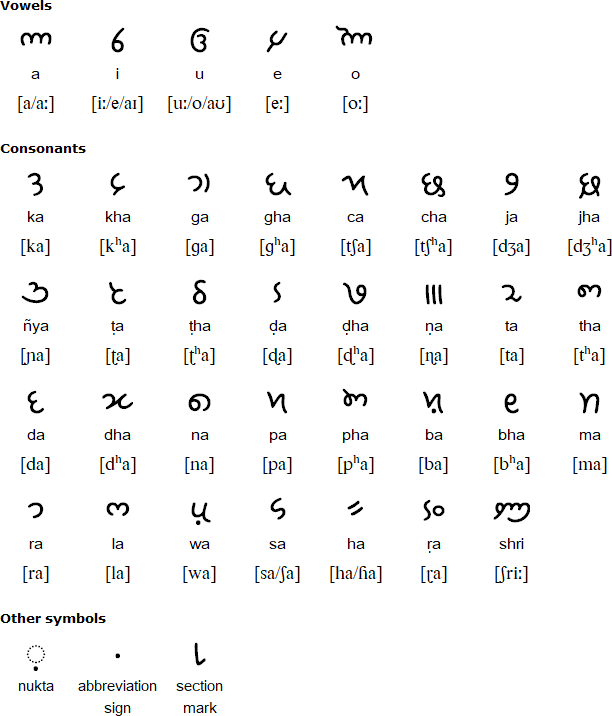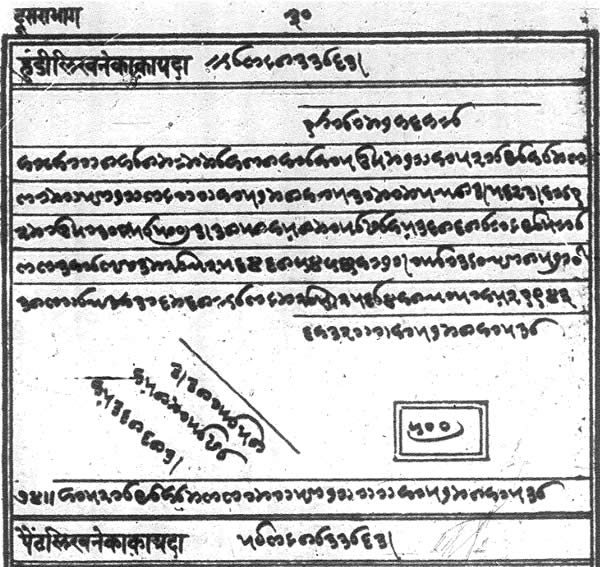The Mahajani alphabet was used in northern India until the mid-20th century to write Hindi, Marwari, Punjabi and other languages. It was used mainly for commercial purposes, and was taught in schools in Punjab, Rajasthan, Uttar Pradesh, Bihar and Madhya Pradesh where students were mainly from merchant and trading communities. It is thought to have developed from the Kaithi script, with influences from Devanagari.
According to a 2004 report in the Tribune, a newspaper in Chandigarh, Langdi Hindi, a variety of the Haryanvi language written in the Mahajani alphabet was used for bookkeeping until the early 21st century.
The name Mahajani comes from the Hindi word महाजन (mahājana), which means banker. The script was used mainly by bankers and money lenders in accounts, merchant diaries, and other finanical documents. There are also books for teaching the script, such as primers and grammars.

The nukta symbol is used for writing sounds that are not represented by a unique character, such as allophonic variants and sounds that occur in local dialects or in loanwords.
Download an alphabet chart for Mahajani (Excel)
Details supplied by Biswajit Mandal (biswajitmandal[dot]bm90[at]gmail[dot]com)

Source: https://www.unicode.org/L2/L2011/11274-n4126-mahajani.pdf

anirodham anutpādam anucchedam aśāśvatam .
anekārtham anānārtham anāgamam anirgamam ..
yaḥ pratītyasamutpādaṃ prapañcopaśamaṃ śivam .
deśayāmāsa saṃbuddhastaṃ vande vadatāṃ varam ..
Source: https://aksharamukha.appspot.com/describe/Mahajani
Information about Mahajani
https://en.wikipedia.org/wiki/Mahajani
https://scriptsource.org/
https://aksharamukha.appspot.com/describe/Mahajani
https://www.unicode.org/L2/L2011/11274-n4126-mahajani.pdf
Ahom, Aima, Arleng, Badagu, Badlit, Basahan, Balinese, Balti-A, Balti-B, Batak, Baybayin, Bengali, Bhaiksuki, Bhujimol, Bilang-bilang, Bima, Blackfoot, Brahmi, Buhid, Burmese, Carrier, Chakma, Cham, Cree, Dehong Dai, Devanagari, Dham Lipi, Dhankari / Sirmauri, Ditema, Dives Akuru, Dogra, Ethiopic, Evēla Akuru, Fox, Fraser, Gond, Goykanadi, Grantha, Gujarati, Gunjala Gondi, Gupta, Gurmukhi, Halbi Lipi, Hanifi, Hanuno'o, Hočąk, Ibalnan, Incung, Inuktitut, Jaunsari Takri, Javanese, Kaithi, Kadamba, Kamarupi, Kannada, Kawi, Kharosthi, Khema, Khe Prih, Khmer, Khojki, Khudabadi, Kirat Rai, Kōchi, Kodava Lipi, Komering, Kulitan, Kurukh Banna, Lampung, Lanna, Lao, Lepcha, Limbu, Lontara/Makasar, Lota Ende, Magar Akkha, Mahajani, Malayalam, Meitei (Modern), Manpuri (Old), Marchen, Meetei Yelhou Mayek, Meroïtic, Masarm Gondi, Modi, Mon, Mongolian Horizontal Square Script, Multani, Nandinagari, Newa, New Tai Lue, Ojibwe, Odia, Ogan, Pahawh Hmong, Pallava, Phags-pa, Purva Licchavi, Qiang / Rma, Ranjana, Rejang (Kaganga), Sasak, Savara, Satera Jontal, Shan, Sharda, Sheek Bakrii Saphaloo, Siddham, Sinhala, Sorang Sompeng, Sourashtra, Soyombo, Sukhothai, Sundanese, Syloti Nagri, Tagbanwa, Tai Noi, Takri, Tamil, Tanchangya (Ka-Pat), Tani, Thaana, Telugu, Thai, Tibetan, Tigalari, Tikamuli, Tocharian, Tolong Siki, Vatteluttu, Warang Citi
Page last modified: 16.03.23
[top]
You can support this site by Buying Me A Coffee, and if you like what you see on this page, you can use the buttons below to share it with people you know.

If you like this site and find it useful, you can support it by making a donation via PayPal or Patreon, or by contributing in other ways. Omniglot is how I make my living.
Note: all links on this site to Amazon.com, Amazon.co.uk
and Amazon.fr
are affiliate links. This means I earn a commission if you click on any of them and buy something. So by clicking on these links you can help to support this site.
[top]